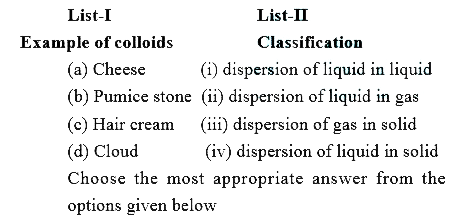The pollution due to oxides of sulphur gets enhanced due to the presence of:
(a) particulate matter
(b) ozone
(c) hydrocarbons
(d) hydrogen peroxide
Choose the most appropriate answer from the options given below:
(a), (d) only
(a), (b), (d) only
(b), (c), (d) only
(a), (c), (d) only
To solve the question regarding which substances enhance pollution due to oxides of sulfur, we will analyze each option step by step.
Step 1: Understanding the Role of Each Option
1. Particulate Matter: Particulate matter can contain various pollutants, including sulfur oxides. When particulate matter is present in the atmosphere, it can facilitate the formation of sulfur oxides, thus enhancing pollution.
2. Ozone: Ozone (O₃) can react with sulfur compounds. The presence of ozone can lead to the oxidation of sulfur dioxide (SO₂) into sulfur trioxide (SO₃), which contributes to the formation of acid rain and increases the pollution levels of sulfur oxides.
3. Hydrocarbons: Hydrocarbons themselves do not directly enhance sulfur oxide pollution. However, they can participate in photochemical reactions that may indirectly affect sulfur compounds in the atmosphere.
4. Hydrogen Peroxide: Hydrogen peroxide (H₂O₂) can also act as an oxidizing agent. It can oxidize sulfur compounds, leading to an increase in sulfur oxides in the atmosphere.
Step 2: Analyzing the Options
- Option (a) Particulate Matter: Enhances pollution due to sulfur oxides.
- Option (b) Ozone: Enhances pollution due to sulfur oxides.
- Option (c) Hydrocarbons: Does not significantly enhance sulfur oxide pollution.
- Option (d) Hydrogen Peroxide: Enhances pollution due to sulfur oxides.
Step 3: Conclusion
From the analysis, we find that options (a), (b), and (d) enhance pollution due to oxides of sulfur. Therefore, the most appropriate answer is:
Answer: (a) Particulate Matter, (b) Ozone, and (d) Hydrogen Peroxide.
1. Particulate Matter: Particulate matter can contain various pollutants, including sulfur oxides. When particulate matter is present in the atmosphere, it can facilitate the formation of sulfur oxides, thus enhancing pollution.
- Option (a) Particulate Matter: Enhances pollution due to sulfur oxides.
- Option (b) Ozone: Enhances pollution due to sulfur oxides.
- Option (c) Hydrocarbons: Does not significantly enhance sulfur oxide pollution.
- Option (d) Hydrogen Peroxide: Enhances pollution due to sulfur oxides.
From the analysis, we find that options (a), (b), and (d) enhance pollution due to oxides of sulfur. Therefore, the most appropriate answer is:
Topper's Solved these Questions
- NEET 2022BOOK - NEET PREVIOUS YEAR (YEARWISE + CHAPTERWISE)CHAPTER - NEET 2022EXERCISE - Section - A (Chemistry)
25 Videos
- NEET 2021BOOK - NEET PREVIOUS YEAR (YEARWISE + CHAPTERWISE)CHAPTER - NEET 2021EXERCISE - QUESTION
50 Videos
- NEET 2023BOOK - NEET PREVIOUS YEAR (YEARWISE + CHAPTERWISE)CHAPTER - NEET 2023EXERCISE - Question
50 Videos
Similar Questions
Knowledge Check
Match List - I with List- II
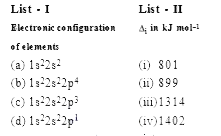
Choose the most appropriate answer from the options given below -A(a)→(ii),(b)→(iii),(c)→(iv),(d)→(i)B(a)→(i),(b)→(iv),(c)→(iii),(d)→(ii)C(a)→(i),(b)→(iii),(c)→(iv),(d)→(ii)D(a)→(iv),(b)→(i),(c)→(ii),(d)→(iii)Match List - I with List- II
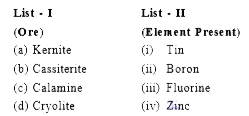
Choose the most appropriate answer from the options given below -A(a)→(i),(b)→(iii),(c)→(iv),(d)→(ii)B(a)→(ii),(b)→(i),(c)→(iv),(d)→(iii)C(a)→(ii),(b)→(iv),(c)→(i),(d)→(iii)D(a)→(iii),(b)→(i),(c)→(ii),(d)→(iv)
Match List-I with List -II
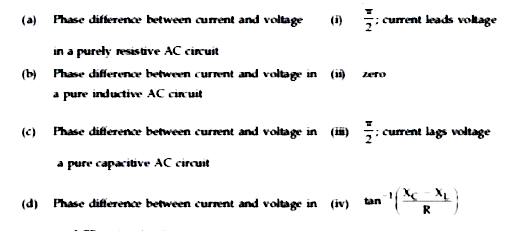
Choose the most appropriate answer from the options given below:
View SolutionMatch List -I with List-II :
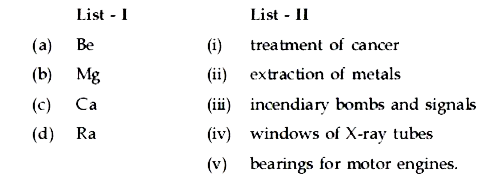
Choose the most appropriate answer from the option given below:
View SolutionMatch List - I with List - II
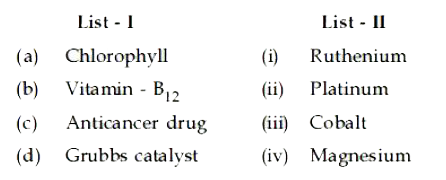
Choose the most appropriate answer from the options given below :
View SolutionMatch List - I with List - II
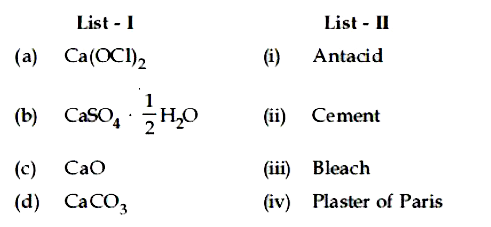
Choose the most appopriate answer from the options given below :
View SolutionMatch List - I with List - II
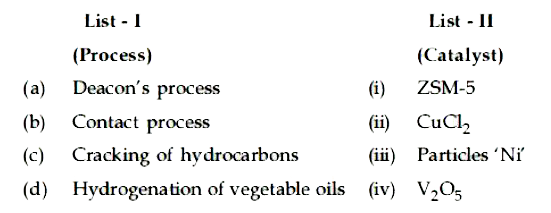
Choose the most appopriate answer from the options given below :
View SolutionMatch List -I with List -II :
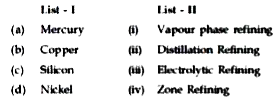
Choose the most appropriate answer from the option given below:
View Solution


